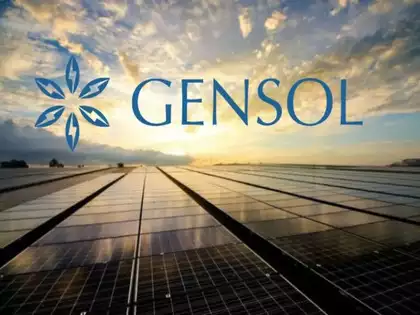Shares of Gensol Engineering, a leading player in the renewable energy and engineering sector, witnessed a significant drop of 20% following a recent downgrade by CARE Ratings. This sharp decline has sent shockwaves through the market, raising concerns among investors and analysts about the company’s future prospects. As one of the more prominent players in the renewable energy space, Gensol’s sudden slide in stock price has attracted attention from both institutional investors and retail shareholders. This article explores the reasons behind the downgrade, the factors influencing the stock’s decline, and what this means for the company’s future.
The Impact of CARE Ratings’ Downgrade
On [specific date], CARE Ratings, one of India’s leading credit rating agencies, downgraded the long-term rating of Gensol Engineering, citing several key concerns related to the company’s financial health and business outlook. The downgrade came as a surprise to many, as Gensol Engineering has been regarded as a growth-oriented company within the renewable energy sector, an industry that has garnered increasing interest and investment in recent years due to the global push towards clean energy solutions.
Following the rating downgrade, Gensol Engineering’s shares experienced a steep decline of 20% on the Bombay Stock Exchange (BSE), a sharp drop that significantly impacted its market capitalization. This drastic shift in stock value has raised questions about the company’s financial position and its ability to maintain sustainable growth in the future. The downgrade sent a clear signal to the market that investors may need to reconsider their positions on the stock, leading to a wave of selling.
Reasons Behind the Downgrade
The downgrade by CARE Ratings was driven by a series of financial and operational concerns that raised doubts about Gensol Engineering’s future performance. One of the primary reasons cited by the rating agency was a decline in the company’s profitability and its ability to generate consistent revenue growth. In recent quarters, Gensol has faced challenges in maintaining healthy margins, which has negatively impacted its earnings potential. The ratings agency also pointed to a high level of debt on the company’s balance sheet, which could restrict its ability to manage cash flow and expand operations effectively.
In addition to these financial issues, CARE Ratings also flagged concerns regarding Gensol Engineering’s exposure to risks related to its project execution timelines. As a company heavily involved in engineering and construction projects, particularly in the renewable energy sector, delays in project execution or unforeseen costs can significantly impact profitability and project timelines. Gensol has experienced project delays in the past, and the rating agency expressed concerns about the company’s ability to meet its contractual obligations within the expected timeframes, which could further strain its financials.
The renewable energy sector, while promising, is also highly competitive, and Gensol faces increasing pressure from both domestic and international players. The company’s ability to innovate and maintain a competitive edge has come into question, as it competes with other established companies in the renewable energy and engineering space. This competitive pressure, combined with ongoing financial challenges, has led to a downgrade in the company’s credit rating.



The Stock’s Decline and Market Reactions
The 20% drop in Gensol Engineering’s share price was a direct reaction to the downgrade, as investors began to reevaluate the company’s risk profile. The sharp fall in stock price has raised concerns about the company’s future growth prospects and its ability to generate sustainable returns for shareholders. Analysts and institutional investors typically view credit rating downgrades as a red flag, indicating potential financial instability or increased risk, which leads to a reassessment of the company’s value in the market.
In the wake of the downgrade, several brokerage firms and analysts revised their target prices for Gensol Engineering’s stock, with some recommending a cautious approach or advising investors to sell off their positions. The negative sentiment surrounding the stock has also led to reduced investor confidence, further contributing to the decline in share prices.
However, some market participants believe that the stock may eventually recover, depending on how Gensol addresses the issues raised by the rating agency. The company has been active in expanding its renewable energy portfolio and exploring new markets, which could offer growth opportunities in the long term. But for now, the downgrade has created significant headwinds for the company, making it harder for it to attract new investments and stabilize its financial position.
The Renewable Energy Sector and Gensol’s Future Outlook
While Gensol Engineering’s near-term prospects appear uncertain due to the rating downgrade, it is important to consider the broader context of the renewable energy sector in India. The country is increasingly shifting towards sustainable energy sources, with the government setting ambitious renewable energy targets, including increasing the share of non-fossil fuels in the country’s energy mix. This transition presents opportunities for companies like Gensol, which specialize in solar power, wind energy, and other renewable solutions.
Despite the challenges the company faces, Gensol’s involvement in the renewable energy sector may still provide growth prospects if it can navigate its operational and financial challenges. The company has already shown some success in executing large-scale projects, and its focus on renewable energy aligns with India’s long-term energy strategy. If Gensol can improve its project execution capabilities and manage its financials more effectively, it may be able to regain investor confidence and stabilize its stock price over time.
Moreover, Gensol’s focus on diversification could also help mitigate some of the risks associated with its core business. Expanding into new markets, both domestically and internationally, may provide the company with additional revenue streams and reduce its dependency on a limited number of clients or projects.
Conclusion: What Investors Should Consider
The recent 20% drop in Gensol Engineering’s share price following the downgrade by CARE Ratings has raised important questions about the company’s financial health and its ability to sustain long-term growth. While the downgrade highlights significant risks related to profitability, debt levels, and project execution, it also offers investors a chance to reassess the company’s potential in the growing renewable energy sector.
For those invested in Gensol, the key takeaway is that the company’s future performance will largely depend on how it addresses its financial challenges and executes its renewable energy projects. Investors should closely monitor the company’s upcoming financial reports, project updates, and strategic initiatives to gain a clearer picture of its recovery prospects. As always, it is important to approach such investments with caution and conduct thorough research before making any decisions in light of the company’s recent downgrade.
FOLLOW:https://newsroom47.com/why-was-iit-baba-taken-into-police-custody/
Newsroom 47
